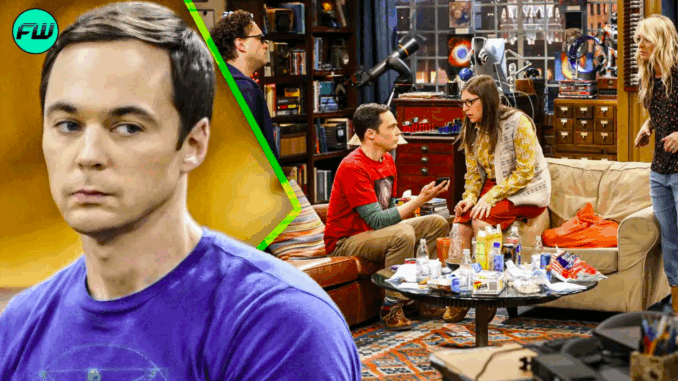
In the vast universe of television sitcoms, few characters have burned as brightly—or as strangely—as Dr. Sheldon Cooper. Played with surgical precision by Jim Parsons, Sheldon debuted on The Big Bang Theory in 2007 as a socially oblivious physicist with a strict schedule, a deep love for trains, and zero tolerance for small talk. But by the time the series concluded in 2019, Sheldon had become a global phenomenon, redefined the rules of TV comedy, and helped reshape how audiences perceive both genius and difference.
The Accidental Star
When The Big Bang Theory launched, Sheldon was never intended to be the show’s main attraction. The early marketing focused on the odd-couple dynamic between Leonard Hofstadter and his beautiful neighbor Penny. But Sheldon—dry, demanding, and armed with obscure trivia—quickly became the gravitational center of the series.
Jim Parsons brought a uniquely theatrical energy to the role, drawing on his classical training to deliver rapid-fire monologues and obsessive routines with an intensity that bordered on genius. Viewers were hooked. Within two seasons, Sheldon had transformed from comic relief to cornerstone, his quirks turning into cultural currency.
“Bazinga!” became a household phrase. The couch seat became sacred. And Thursday nights belonged to a guy who couldn’t recognize sarcasm if it hit him with a Klingon bat’leth.
A New Kind of Comedy
Sheldon wasn’t your typical sitcom protagonist. He wasn’t a charming womanizer like Joey Tribbiani or a lovable buffoon like Michael Scott. He was rigid, pedantic, and often unintentionally cruel. Yet audiences loved him—not in spite of his flaws, but because of them.
What made Sheldon’s comedy revolutionary was its specificity. His humor wasn’t built on punchlines, but on patterns: the rhythm of his speech, his encyclopedic references, his complete misunderstanding of human behavior. His interactions weren’t traditional setups and payoffs—they were equations that viewers learned to solve over time.
This was nerd humor at its purest, and for the first time on network television, it didn’t feel niche. It felt universal.
The Debate Around Neurodiversity
As the show gained popularity, Sheldon became a focal point for broader conversations around neurodiversity. Though never explicitly diagnosed on-screen, many fans and experts have interpreted Sheldon’s behavior as being consistent with characteristics of autism or obsessive-compulsive disorder.
This led to passionate debates: Should the show have acknowledged this directly? Was Sheldon a respectful representation or a caricature?
Jim Parsons himself has weighed in thoughtfully over the years, expressing deep empathy for the character while also acknowledging that Sheldon was, first and foremost, fictional. The show’s creators maintained that Sheldon was written as “Sheldon”—not as a diagnosis. Still, for many viewers on the spectrum, Sheldon was the first time they saw someone like themselves on TV, portrayed with complexity rather than mockery.
In a television landscape often lacking in nuanced portrayals of neurodivergence, Sheldon became a strangely vital figure.
An Emmy-Winning Legacy
Jim Parsons’ portrayal of Sheldon earned him four Emmy Awards and a Golden Globe, making him one of the most decorated comedy actors of the decade. But his influence extended beyond trophies.
Parsons turned what could have been a one-note stereotype into a layered, evolving character. Over 12 seasons, viewers watched Sheldon form friendships, navigate loss, fall in love with Amy Farrah Fowler, and—miraculously—mature. His wedding to Amy wasn’t just a ratings high point. It was a triumph of character development.
And when The Big Bang Theory finally ended, it was Sheldon who delivered the show’s final monologue—a heartfelt, deeply human expression of gratitude. The applause that followed wasn’t just for the speech. It was for the journey.
The Spin-Off Effect

Sheldon’s impact didn’t end with the series finale. In 2017, CBS launched Young Sheldon, a prequel series exploring his childhood in Texas. Though initially met with skepticism, the show has become a quiet success, offering new emotional context to the adult Sheldon viewers came to love.
What could have felt like a cynical cash-in became a surprisingly sincere portrait of a gifted child navigating family, faith, and social confusion—all while laying the groundwork for the adult Sheldon’s peculiarities.
And it reinforced a simple truth: audiences still cared deeply about this character.
The Cultural Footprint
Today, Sheldon Cooper remains one of the most recognizable characters in television history. He’s been turned into Funko Pops, Halloween costumes, and academic essays. He’s been both praised and parodied. But most importantly, he’s lasted.
In an entertainment world where sitcoms come and go, Sheldon Cooper has endured. Because behind the knock-knock jokes and the smugness was something deeply compelling: a person trying to understand the world around him, on his own terms, with a brain that never shut off and a heart that—eventually—learned how to open.
Conclusion: The Genius of Being Different
Sheldon didn’t just redefine how TV treats intelligence—he redefined how it treats difference. He showed that comedy doesn’t always need cool or charismatic. Sometimes, it needs unapologetically weird.
And that, in itself, was a stroke of genius.